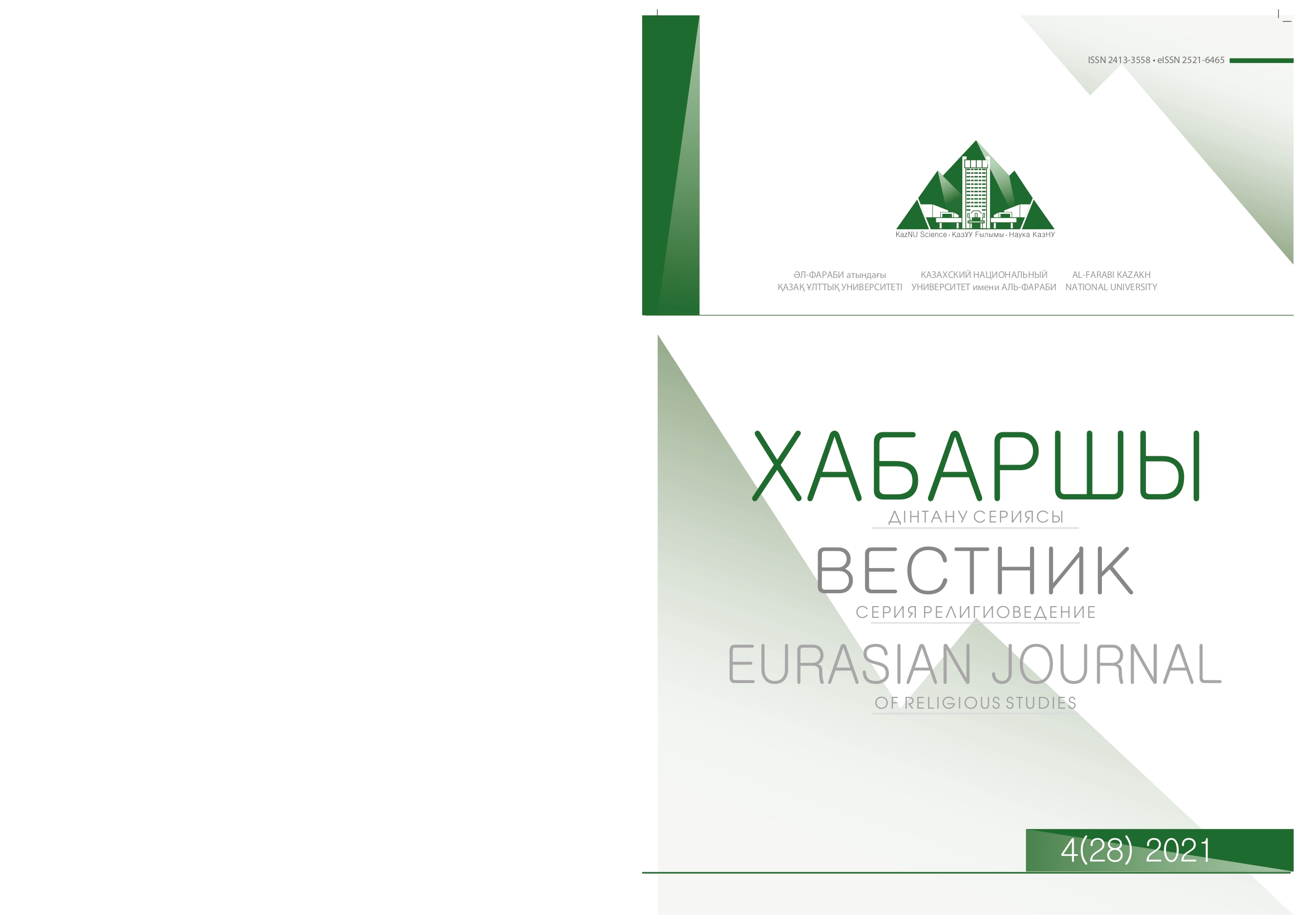Wisdom of Islamic culture in the information world
DOI:
https://doi.org/10.26577//EJRS.2021.v28.i4.r10Keywords:
wisdom, digital environment, information society, modern society, Islamic cultureAbstract
A person's religious life is filled with great content. It is based on the struggle with your inner passions and sins, which you managed to discern in yourself. No religion recognizes extremism and violence. Any religion is based on the ideas of goodness, justice, peace and friendship. All wrong paths to the heart of the believer lead to conflict. Knowledge of the basics of a particular religion allows you to avoid enmity. This article provides a brief analysis of the Muslim doctrine and Muslim culture, as factors in the development of friendship and peace, as a wise and worthy of great attention, a phenomenon. A correct understanding of the meanings of peace and friendship in religion is important in the conditions of the 21st century. Right now is the time for big changes. Modern society must go through a crisis of lack of spirituality. And in our opinion, this crisis is already passing, the time of peace and friendship between peoples is beginning, the time of wise people is coming, the era of wisdom is approaching. In the article, based on the study of Islamic culture and Islamic worldview, the significance of traditional values for the development of the people in the modern digital (intersubjective, devastated, faceless) social space is determined.
Keywords: Wisdom, digital environment, information society, modern society, Islamic culture.
References
Абдулатипов Р.Г. (2010) На дружбе народов держится мир // Вестник Московского государственного университета культуры и искусств. № 2 (34). – 8-20.
Бодрийяр Ж., Сиоран Э. (2020) Матрица Апокалипсиса / Пер. с фр. – М.: Родина. – 272.
Володихин Д., Алексеев С., Бенедиктов К., Иртенина Н. (2006) Традиция и русская цивилизация /. – М.: Астрель: АСТ: Транзиткнига. – 282.
Генон Р. (2012) Духовное владычество и мирская власть. Пер. с фр. Н.Тирос. – М.: Беловодье. – 208.
Зимери С. (2020) Ислам без ислама // Vita Cogitans: Альманах молодых философов. № 11. – 146-166.
Кара-Мурза С.Г. (2009) Власть манипуляции. – Изд. 2-е. - М.: Академический Проект. – 380.
Катасонов А.Ю. (2019) В начале было слово, а в конце будет цифра. Статьи и очерки. – М.: «Кислород». - 576.
Кожевников А.Ю., Линдберг Т.Б. (2013) Мудрость ислама. М.: ОЛМА Медиа Групп. – 304.
Крачковского И.Ю. (2018) Коран в хрнологическом порядке сур / Пер с араб. – СПб.: МЕРА. - 438.
Луман Н. (2007) Социальные системы. Очерк общей теории. Пер. с Нем. И.Д. Газиева. под редакцией Н.А. Головина. Спб.: «НАУКА». - 2007.
Насыров И. (2018) Пост-ислам или культурный ислам? // Философская антропология. Т. 4. № 1. – 46-54.
Тимощук Е.А. (2020) Медиареальность в фокусе феноменологии // Современный дискурс-анализ. № 2-1 (26). – 71-80.
Фромм Э. (2015) Здоровое общество / Эрих Фромм; [пер. с англ. Т.Банкетовой, С.Карпушиной]. – Москва: АСТ . – 448.
References
Abdulatipov R.G. (2010) Na druzhbe narodov derzhitsya mir [Peace inherited in friendship of nations]// Vestnik Moskovskogo gosudarstvennogo universiteta kultury i iskusstv. № 2 (34). - 8-20. (in Russian)
Bodriyyar Zh.. Sioran E. (2020) Matritsa Apokalipsisa [The Apocalypses of Matric]/ Per. s fr. – M.: Rodina. – 272. (in Russian)
Fromm E. (2015) Zdorovoye obshchestvo [Health of Society]/ Erikh Fromm; [per. s angl. T.Banketovoy. S.Karpushinoy]. – Moskva: AST. – 448.
Genon R. (2012) Dukhovnoye vladychestvo i mirskaya vlast. Per. s Fr.:N.Tiros. – M.: Belovodye. – 208. (in Russian)
Kara-Murza S.G. (2009) Vlast manipulyatsii [Power of the Manupulation]. – 2nd ed. - M.: Akademicheskiy Proyekt. – 380. (in Russian)
Katasonov A.Yu. (2019) V nachale bylo slovo. a v kontse budet tsifra. Stati i ocherki [Word in the beginning. Numbers in the end. Articles]. – M.: Izdatelskiy dom «Kislorod». – 576. (in Russian)
Kozhevnikov A.Yu., Lindberg T.B. (2013) Mudrost islama [Wisdom of Islam]. – M.: OLMA Media Grupp. – 304. (in Russian)
Krachkovskogo I.Yu. (2018) Koran v khrnologicheskom poryadke sur [Qur`an in chronological alphabet]/ Per s arab. – SPb.: MERA. – 438. (in Russian)
Lahmar, Fella. 2020. "Islamic Education: An Islamic “Wisdom-Based Cultural Environment” in a Western Context" Religions 11, no. 8: 409. https://doi.org/10.3390/rel11080409
Luman N. (2007) Sotsialnyye sistemy [Social system. Tr. From German by I.D.Gaziyeva, ed. N.A.Golovina]. Ocherk obshchey teorii. Per. s Nem. I.D.Gaziyeva. pod redaktsiyey N.A.Golovina. – Spb.: «NAUKA».
Michel Ferrari, Aftab Kahn, Marcus Benayon, and Julie Nero (2011) Phronesis, Sophia, and Hochma: Developing Wisdom in Islam and Judaism // Research in Human Development,-Volume 8, 2011. https://doi.org/10.1080/15427609.2011.568869
Nasyrov I. (2018) Post-islam ili kulturnyy islam? [Post Islam or Cultural Islam]// Filosofskaya antropologiya. T. 4. № 1. - 46-54. (in Russian)
Timoshchuk E.A. (2020) Mediarealnost v fokuse fenomenologii [Media reality in phenomenological focus]// Sovremennyy diskurs-analiz. 2020. № 2-1 (26). S. 71-80. (in Russian)
Volodikhin, D., Alekseyev, S., Benediktov, K. and Irtenina, N. (2006) Traditsiya i russkaya tsivilizatsiya [Tradition and Russian Civilization]. – M.: Astrel: AST: Tranzitkniga. – 282. (in Russian)
Zimeri S. (2020) Islam bez islama [Islam without Islam]// Vita Cogitans: Almanakh molodykh filosofov. № 11. – 146-166. (in Russian)




